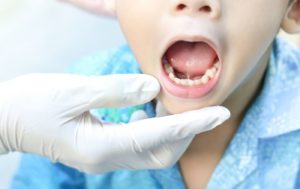Many adults experience anxiety about going to the dentist, so it’s hardly surprising that children suffer similar apprehension when faced with a dental appointment.
Without proper dental care from a young age, kids face significant health risks such as tooth loss and gum disease that can spread to other parts of the body, including the lungs, brain, and heart. Damaged or stained teeth can also make youngsters feel self-conscious, and lower their self-esteem.
To help you minimize your kids’ fear of the dentist, we’ve put together a five-point guide to help make sure that your child has a positive experience at the dental office.
Tip #1: Start Your Child’s Dental Visits Early
Health information platform WebMD says parents and dentists both have a crucial role in making a child’s first dental appointment a positive experience. But when should you take your infant for that first dental check-up? Many dentists advocate an initial visit before the child’s first birthday to ensure teeth and gums are in good condition.
A baby typically begins teething from three to nine months, and dental care will make sure these primary teeth remain free of decay or other dental problems. If bacteria are allowed to build up, this may lead to tooth decay and/or infection of the gum tissue.
Regular, early dental care has twin benefits: children get into the habit of seeing the dentist while they’re still young, and possibly less fearful, and staying on top of any potential issues will lessen their chances of needing extensive treatment further down the line. The American Academy of Pediatric Dentistry (AAPD) says dental anxiety in children can be diminished by starting regular visits to the dentist before a problem like a cavity develops.
If you establish a routine of regular dental visits from the time your child’s first tooth emerges, they will accept that seeing the dentist is a normal part of growing up. Regular preventative dental check-ups will acclimatize them to the dental office and they’ll learn they can trust their dentist.
Tip #2: Don’t Pass on Your Own Fears
Studies have shown that fear of the dentist can unwittingly be transmitted by parents to their offspring. Some adults may have just mild worries about dental visits, but in others, this nervousness can become a mental health condition called odontophobia (dental phobia).
If you display a negative attitude about dental visits, your children may well see this as normal behavior, and react the same way when they need a dental check-up or treatment. Whatever the cause of your own dental anxieties, it’s important to make a conscious effort to ensure your kids learn to regard regular dental visits as part of their oral healthcare routine.
The American Academy of Pediatric Dentistry advises parents to avoid negative language ahead of their youngster’s dental visit. Positive phrases like “clean, healthy teeth” will make the visit seem fun rather than scary.
Relating stories about your own experiences of extractions and root canals will trigger unnecessary nervousness in your child, especially when they may not even need these procedures. Instead, bring the world of the dental office into your home in a playful way. For instance, you can let your child assume the role of the dentist to examine your teeth. Try to find children’s books with stories about positive experiences with dentists.
Tip #3: Find a Dental Office that Specializes in Treating Children
Pediatric and family dentists are experienced in allaying the fears of their young patients. You may be happy with your own general dentist but a practice that specializes in treating kids will have a greater degree of experience and expertise in handling youngsters. Pediatric dentists undergo extra training, emphasizing child psychology, growth, and development, so they are experts in treating fearful young patients.
The Consumer Guide to Dentistry says pediatric dentists can provide a specialized focus on your child that general dentists may not be able to offer, and that choosing a pediatric dentist will help to ensure your child gets the best, most advanced care and treatments.
KidSmile Dental is designed to be child-friendly to help put youngsters at ease.
We strive to make sure children to be diagnosed and treated in the safest, gentlest way – and with a strong emphasis on preventive care, such as dental sealants and fluoride treatments, to safeguard your child’s teeth.
Tip #4: Give Your Child Ample Notice of a Dental Appointment
It can be tempting to keep your child in the dark about a forthcoming visit to the dentist until just before the appointment. But this will compact any anxiety into a shorter space of time, and could even result in a panic attack.
Your child may also begin to distrust you. Telling your child well in advance about a dental appointment gives them time to get used to the idea, and allows you to address any concerns they may have.
Be as open and positive as possible. Explain the procedure in a way they can easily grasp. Communicating with your child like this will help to build trust between you while they learn more about why they are going to see the dentist in the first place.
Tip #5: Remember that Sedation is an Option
In some cases, particularly with treatments such as fillings or extractions, it may ease your child’s anxiety if they know that sedation may be appropriate to help them cope with the experience. Ivory Dental said that, “Sedation dentistry does not mean you have to be put to sleep. There are several ways to calm a dental patient while remaining awake.”
Typical methods of safe oral sedation offered by pediatric dentists include oral conscious sedation, which entails taking a pill shortly before the procedure – no needles! In some cases, inhalation sedation using nitrous oxide (laughing gas) can be an alternative to oral sedation. The gas helps kids to relax during the procedure but then wears off quickly.
If general anesthesia is required for a major procedure, your child will be asleep during the entire treatment. Look for a pediatric dentistry practice that administers general anesthetic in a gentle and safe way, with a team of doctors on hand to ensure the process runs smoothly.






